19 Jan2021
By Meghan Grenda
AACTE’s new Member Spotlight features an individual from a member institution, highlighting how their work makes a difference in classrooms across the country. Nominate yourself or another member by providing a response to the following questions and sending to mgrenda@aacte.org.
 Get to know Will Coghill-Behrends …
Get to know Will Coghill-Behrends …
Current position: Clinical Associate Professor, Multilingual Education; Co-Director, Baker Teacher Leader Center (Global Education Initiatives)
Number of years in position: 6
Alma Mater(s): University of Northern Iowa; University of Iowa
Hometown: Bettendorf, Iowa
- How long have you been a member of AACTE?
I’ve been a member of AACTE since 2015, though our institution has been a member for much longer, so by association, I’ve been a member for longer than that, I suppose.
- Why did you join AACTE?
I started taking a more active role in AACTE when we decided to adopt edTPA as our Program Completion Assessment.
- Why did you decide to enter the field of educator preparation?
I was teaching German at the local high school and was asked to teach a course in the teacher preparation program that I had also taught in graduate school. The course was focused on technology in the classroom and that opportunity led to additional teaching opportunities and eventually some grant work on teacher portfolio assessment that pulled me full time into the College of Education and that was all she wrote.
19 Jan2021
By Jerrica Thurman

AACTE’s engaging concurrent sessions, known as Learning Labs, will offer attendees hundreds of topic options during the virtual 2021 Annual Meeting. Come experience these enhanced sessions, categorized by these types:
- Case Stories sessions feature quality storytelling designed to illuminate real world case studies that demonstrate innovation or breakthrough practices.
- Data to Action sessions release recent data in ways that encourage attendees to discuss its relevance and practicality in everyday settings.
- Future Casting sessions explore the creation of “next practices” as opposed to and/or in addition to exploring current best practices.
- Paper Sessions feature two presentations focused on a similar topic centered around the event strands.
- Perspectives sessions address a current topic or concern that is germane to educator preparation framed as a research, policy, or program question.
- Roundtables sessions focus on a particular topic and are led by an individual or a small group.
- Scenario Planning sessions help attendees consider and discuss a variety of actions that might take place because of changing conditions.
15 Jan2021
By Michael Rose
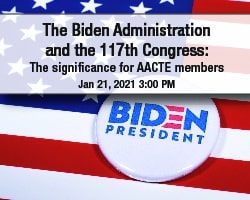 The events of January 6 shocked the nation. We witnessed a challenge to our democracy that none of us could ever have imagined.
The events of January 6 shocked the nation. We witnessed a challenge to our democracy that none of us could ever have imagined.
Just days before, senators and representatives were peacefully sworn in to the 117th Congress. On Wednesday, the joint session of the United States Congress was just beginning to count the electoral college votes for president and vice president when rioters stormed into the United States Capital, one of the nation’s most treasured buildings.
Fortunately, order was eventually established, and the joint session continued its work. This was the final step before Joseph Biden and Kamala Harris are sworn in as the U.S. president and vice president, respectively, on January 20. It also means that Democrats will control the House of Representatives, Senate and White House and give them significant leverage to implement their legislative priorities.
What does all this mean for AACTE, its members, and the students they work with?
15 Jan2021
By John Henning

As a member of AACTE’s Meetings and Professional Development Committee, it has been exciting to see this year’s Annual Meeting come together. Given the tragic events of the past few weeks, the conference theme of “Resisting Hate, Restoring Hope: Engaging in Courageous Action” is even more relevant today than a year ago. It is an affirmation that we truly live in a time that calls upon each and every one of us to restore hope through courageous action.
This year’s keynote speakers embody this mission. Award-winning author and professor, Bettina L. Love, will show us how to build communal, civically-engaged schools that love and affirm Black and Brown children. Our need for a healthier political climate, one that honors democracy through integrity and public service will be addressed by acclaimed, presidential historian Michael Beschloss.
14 Jan2021
By Jerrica Thurman
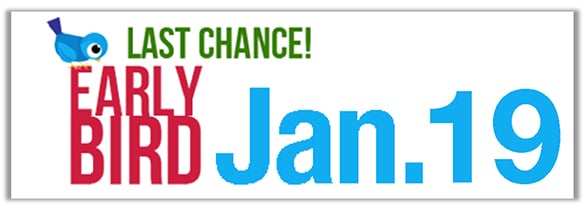 Tuesday, January 19, is the Early Bird registration deadline for th AACTE 2021 Annual Meeting, February 24-26
Tuesday, January 19, is the Early Bird registration deadline for th AACTE 2021 Annual Meeting, February 24-26. Get the lowest registration rate when you
register by
12 midnight. Secure your spot for the conference in just a few seconds!
Engage with colleagues around imperative issues in education during AACTE’s Deeper Dives. This year’s sessions will explore:
- Leading in the Time of Crisis: Responding to COVID-19 and Social Justice Movements
- Effective Online Pedagogy and Learning: Applying Technology-Enhanced Teaching Strategies to the New Normal in 2021 and Beyond
- The 1619 Project
- Critical-Race Theory and Countering Political Culture
- Advancing Equity through Social Emotional Learning
- Teacher Performance Assessments as a Tool For Teacher Learning, Program Improvement, and Accountability
14 Jan2021
By Nicole Dunn
 In this new year, AACTE is recommitting its efforts to support the field in combating the racism that permeates throughout our education system. As a part of these efforts, AACTE will host a webinar each month that is centered on naming, learning, addressing, reforming, and promoting antiracist culture and policies throughout the education system. During these one-hour virtual sessions, you will hear from members and leaders in the field who have been doing the research and work to ensure PK-12 students receive a truly inclusive education. Our goal is for all participants, whether you are an administrator, faculty member, candidate, or current practitioner, to walk away with actionable steps to address internal, interpersonal, and systemic racism.
In this new year, AACTE is recommitting its efforts to support the field in combating the racism that permeates throughout our education system. As a part of these efforts, AACTE will host a webinar each month that is centered on naming, learning, addressing, reforming, and promoting antiracist culture and policies throughout the education system. During these one-hour virtual sessions, you will hear from members and leaders in the field who have been doing the research and work to ensure PK-12 students receive a truly inclusive education. Our goal is for all participants, whether you are an administrator, faculty member, candidate, or current practitioner, to walk away with actionable steps to address internal, interpersonal, and systemic racism.
Racism is a broad and entrenched system of discrimination that has been largely ignored in our history, and every individual in our education system has a part to play in correcting it. Therefore, to begin this series, we want to focus on Discussing Race in Classrooms. In addition to learning how to prepare candidates to discuss racism in PK-12 classrooms, the webinar will address how educator preparation programs and other education field leaders can do the internal, interpersonal, and system-wide work to effectively support and prepare candidates to do so within those programs.
Register Today to join AACTE and the esteemed panel for or its first webinar: Discussing Race in PK-12 Classrooms, Why it’s an Essential Skill, on January 25, 2:00 p.m. EST. We exist in a world of relationships, and therefore, it is imperative that we examine our country’s and our education system’s historic relationship with racism and students of color before we endeavor to implement antiracist policies in our programs. In this session, we will take a look back at the central historic systemic inequities that have created an environment in which a majority of educators are ill-prepared and unwilling to name and discuss race and racism in classrooms. From that historical perspective, we will look at its effects on discipline and special education systems, both of which maintain systemic inequities and exacerbate racial discrimination for students with intersectional identities.
Register for Discussing Race in PK-12 Classrooms, Why It’s an Essential Skill
13 Jan2021
By Brian McNeill
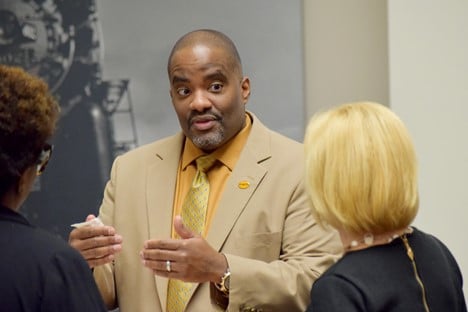
This article originally appeared in VCU News and is reprinted with permission.
Andrew P. Daire, Ph.D., dean of the School of Education at Virginia Commonwealth University, was appointed Wednesday as a co-chair of Virginia’s new advisory committee charged with making recommendations on culturally relevant and inclusive education practices in Virginia’s public schools.
The Culturally Relevant and Inclusive Education Practices Advisory Committee, which was established by the General Assembly during the 2020 session, held its inaugural virtual meeting Wednesday and Gov. Ralph Northam announced its leadership and members.
“Inclusive and culturally relevant learning environments are vital to creating equitable pathways to success for all Virginians,” Northam said in a news release. “The work of this committee will advance our ongoing efforts to tell the complete and accurate story of Virginia’s complex past, improve our history standards, and give educators opportunities to engage in important conversations and lessons with their students.”
12 Jan2021
By Gail Richmond
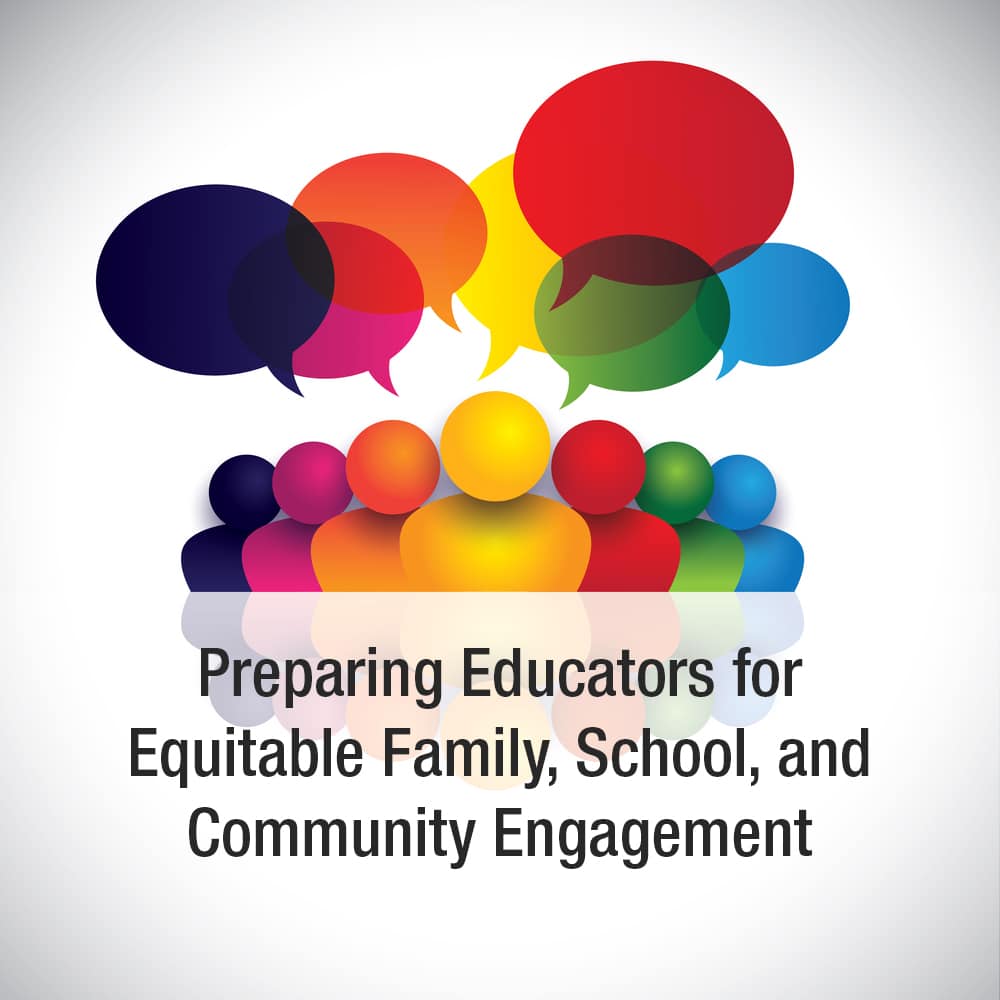 During the virtual AACTE 2021 Annual Meeting, attendees are invited to join their peers at the Learning Lab session, Preparing Educators for Equitable Family, School, and Community Engagement on Thursday, February 25 from 3:45 – 4:45 p.m. AACTE member Gail Richmond of Michigan State University addresses this topic in the following thought leadership article.
During the virtual AACTE 2021 Annual Meeting, attendees are invited to join their peers at the Learning Lab session, Preparing Educators for Equitable Family, School, and Community Engagement on Thursday, February 25 from 3:45 – 4:45 p.m. AACTE member Gail Richmond of Michigan State University addresses this topic in the following thought leadership article.
Effective educators see themselves as more than just employees in a building. They consider themselves to be contributing members of a greater community. Educators do so much more than teach children academic lessons; they play a very important role in helping families and preparing young people to lead healthy and productive lives and to make their communities supportive and safe places to live. The more teachers know about the needs of their students, their families, and the communities in which they live, the more responsive they can be to those needs.
Powerful professional learning is the result of identifying and addressing relevant problems specific to individuals based on their own development and needs. Powerful professional learning also enables teachers to expand their perspectives and to refine their teaching strategies in order to be responsive to the students they educate, their family members, and the greater community.
12 Jan2021
By Matthew Wales

Meeting as we complete the final stages of planning. We are confident the content offerings will both spark and support positive change and growth for you, your institutions, and for our profession.
If there is one thing we have learned during the COVID-19 pandemic, it is that flexibility and patience are more important than ever. We have heard from a multitude of AACTE members that today’s early bird registration deadline for the Annual Meeting is too soon. Many of you are just returning to campus after a well-deserved winter break, and simply put, need a few more days to coordinate both your registration and payment. AACTE both hears your request and understands your point of view, and we are happy to extend the deadline.
Please be sure to register for the AACTE 2021 Annual Meeting at the early bird discount by next Tuesday, January 19. And, remember:
12 Jan2021
By Katrina Norfleet
 AACTE is pleased to announce that Michael Rose has joined its staff as senior director of federal relations and policy as part of the Research, Policy and Advocacy team.
AACTE is pleased to announce that Michael Rose has joined its staff as senior director of federal relations and policy as part of the Research, Policy and Advocacy team.
Rose is an experienced government relations professional with over 20 years of experience. He started his career in Washington, DC, working for U.S. Senator Frank Lautenberg from his home state of New Jersey. After the senator’s retirement, Rose worked for more than six years in the House of Representatives for Congresswoman Maxine Waters. Most recently, Rose was the director of government affairs for the National Association for College Admission Counseling. In this role, he was the association’s main contact for Members of Congress, congressional staff, and various federal agencies regarding its college access and student protections agendas, among other issues.
12 Jan2021
By Jane E. West
This blog post is written by AACTE consultant Jane West and is intended to provide updated information. The views expressed in this post do not necessarily reflect the views of AACTE.
 The 117th Congress Begins
The 117th Congress Begins
Members of the 117th Congress were sworn in on January 3. Just three days later, they faced the unimaginable trauma of a breach of the Capitol by a mob of Trump supporters disrupting the certification of the electoral votes that would confirm Joe Biden as the next president of the United States. Despite the mayhem, chaos, and fear, after the Capitol was cleared, lawmakers went back to work and at 3 a.m. on January 7 confirmed the results of the election. Challenges to the electoral results by over 100 Republican Members of Congress were defeated, as both Republicans and Democrats—including Majority Leader Mitch McConnell (R-KY) and Sen. Mitt Romney (R-UT)—railed against the tactic.
Just days before the Capitol breach, Rep. Nancy Pelosi (D-CA) was voted in, once again, as the Speaker of the House—albeit by a narrow margin. The vote seals Pelosi in the record books as the first woman, and the first person in six decades, to regain the speaker’s gavel—now twice—after losing it.
11 Jan2021
By Jerrica Thurman
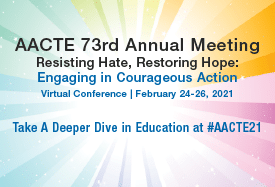 As AACTE heads into the final weeks of planning for the 73rd Annual Meeting, we can’t wait to welcome you to the virtual conference! Be sure to visit the Online Event Planner to create a personal schedule that makes the most of your time. In addition to adding the speaker spotlight and opening and closing keynote sessions, you’ll want to select the Learning Labs and “Deeper Dive” sessions that are of greatest interest to you.
As AACTE heads into the final weeks of planning for the 73rd Annual Meeting, we can’t wait to welcome you to the virtual conference! Be sure to visit the Online Event Planner to create a personal schedule that makes the most of your time. In addition to adding the speaker spotlight and opening and closing keynote sessions, you’ll want to select the Learning Labs and “Deeper Dive” sessions that are of greatest interest to you.
The Deeper Dives provide a large-format, expert-facilitated exploration of a key topic during one dedicated time slot each day. Six sessions will be offered this year in three time slots:
07 Jan2021
By JTE Insider
Check out a recent JTE Insider podcast by the Journal of Teacher Education (JTE) editorial team. This blog is available to the public, and AACTE members have free access to the articles in the JTE online archives—just log in with your AACTE profile.
This podcast interview features insights from the article, “Contrast, Commonality, and a Call for Clarity: A Review of the Use of Core Practices in Teacher Education,” by Dana Grosser-Clarkson and Michael A. Neel. The article was published in the September/October 2020 issue of the Journal of Teacher Education.
Article Abstract: In recent years, substantial resources have been invested in researching and describing the enactment of “core practices” of teaching in teacher education. This review of the literature examined more than 40 articles published between 2008 and August 2018 in an effort to determine how teacher educators are supporting teacher candidates to learn about and enact core practices of teaching. The review of the literature presented here demonstrates two distinct approaches that teacher educators use to introduce and prepare teacher candidates to enact core practices: a predesigned enactment approach and an open-design enactment approach. Our goal in identifying these two approaches is to illuminate the role and actions of teacher educators in core-practice work and to demonstrate that the decisions teacher educators make in core-practice work are complex and nuanced, and require further description than heretofore available.
07 Jan2021
By Andrew Schiera
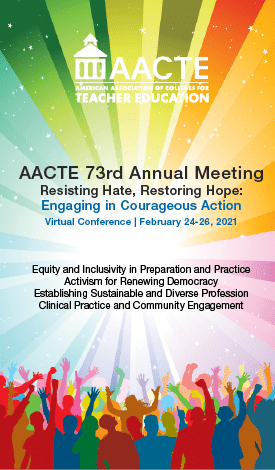 During the virtual AACTE 2021 Annual Meeting, attendees are invited to join their peers at the Deeper Dive Session, Leading in the Time of Crisis: Responding to COVID19 and Social Justice Movements, Wednesday, February 24 at 4:00 – 5:15 p.m. AACTE member Andrew J. Schiera of the University of Pennsylvania Graduate School of Education addresses this topic in the following thought leadership article.
During the virtual AACTE 2021 Annual Meeting, attendees are invited to join their peers at the Deeper Dive Session, Leading in the Time of Crisis: Responding to COVID19 and Social Justice Movements, Wednesday, February 24 at 4:00 – 5:15 p.m. AACTE member Andrew J. Schiera of the University of Pennsylvania Graduate School of Education addresses this topic in the following thought leadership article.
Our world has never experienced anything like it did in 2020. Last year, we found ourselves at a major crossroad. Amidst fighting a global pandemic, our country also experienced intense civil unrest and protests due to the killings of George Floyd, Breonna Taylor, Ahmaud Arbery, and others. We have all been deeply affected by these events, and our nation’s teachers have been thrust into a world unknown. They must not only become practical-minded, on-the-ground social justice educators but must learn how to do so effectively in an ever-changing virtual environment. Now, more than ever, we must dig deep into what we know as teacher educators and to listen, anticipate, and plan rather than reacting to barriers (both expected and unexpected) that emerge along the way.
07 Jan2021
By AACTE
The following statement was included in a Washington Post article on January 7.
AACTE President and CEO Lynn M. Gangone issued the following statement today regarding the horrific events that took place yesterday, January 6, 2021, at the U.S. Capitol building:
“Our nation experienced a serious threat to our treasured democracy as rioters stormed one of our nation’s sacred buildings, the U.S. Capitol, intending damage and insurrection. We witnessed a challenge to our democracy that none of us could ever have imagined. Generated by our nation’s President, some Members of Congress, and their denial of the results of our free and open electoral process, this unlawful invasion of the Capitol has left us all stunned. Never could we imagine such an event would occur in our nation’s capital, the seat of our democracy.
We are further outraged by the vast difference in how these rioters were treated by police as compared to how peaceful protesters for Black Lives Matter have been treated. The discrepancies are stark and maddening.
 Get to know Will Coghill-Behrends …
Get to know Will Coghill-Behrends …


 The events of January 6 shocked the nation. We witnessed a challenge to our democracy that none of us could ever have imagined.
The events of January 6 shocked the nation. We witnessed a challenge to our democracy that none of us could ever have imagined. 
 Tuesday, January 19, is the Early Bird registration deadline for th
Tuesday, January 19, is the Early Bird registration deadline for th  In this new year, AACTE is recommitting its efforts to support the field in combating the racism that permeates throughout our education system. As a part of these efforts, AACTE will host a webinar each month that is centered on naming, learning, addressing, reforming, and promoting antiracist culture and policies throughout the education system. During these one-hour virtual sessions, you will hear from members and leaders in the field who have been doing the research and work to ensure PK-12 students receive a truly inclusive education. Our goal is for all participants, whether you are an administrator, faculty member, candidate, or current practitioner, to walk away with actionable steps to address internal, interpersonal, and systemic racism.
In this new year, AACTE is recommitting its efforts to support the field in combating the racism that permeates throughout our education system. As a part of these efforts, AACTE will host a webinar each month that is centered on naming, learning, addressing, reforming, and promoting antiracist culture and policies throughout the education system. During these one-hour virtual sessions, you will hear from members and leaders in the field who have been doing the research and work to ensure PK-12 students receive a truly inclusive education. Our goal is for all participants, whether you are an administrator, faculty member, candidate, or current practitioner, to walk away with actionable steps to address internal, interpersonal, and systemic racism.
 During the virtual AACTE 2021 Annual Meeting, attendees are invited to join their peers at the Learning Lab session, Preparing Educators for Equitable Family, School, and Community Engagement on Thursday, February 25 from 3:45 – 4:45 p.m. AACTE member Gail Richmond of Michigan State University addresses this topic in the following thought leadership article.
During the virtual AACTE 2021 Annual Meeting, attendees are invited to join their peers at the Learning Lab session, Preparing Educators for Equitable Family, School, and Community Engagement on Thursday, February 25 from 3:45 – 4:45 p.m. AACTE member Gail Richmond of Michigan State University addresses this topic in the following thought leadership article.  AACTE is pleased to announce that Michael Rose has joined its staff as senior director of federal relations and policy as part of the Research, Policy and Advocacy team.
AACTE is pleased to announce that Michael Rose has joined its staff as senior director of federal relations and policy as part of the Research, Policy and Advocacy team. The 117th Congress Begins
The 117th Congress Begins As AACTE heads into the final weeks of planning for the
As AACTE heads into the final weeks of planning for the  During the virtual AACTE 2021 Annual Meeting, attendees are invited to join their peers at the Deeper Dive Session, Leading in the Time of Crisis: Responding to COVID19 and Social Justice Movements, Wednesday, February 24 at 4:00 – 5:15 p.m. AACTE member Andrew J. Schiera of the University of Pennsylvania Graduate School of Education addresses this topic in the following thought leadership article.
During the virtual AACTE 2021 Annual Meeting, attendees are invited to join their peers at the Deeper Dive Session, Leading in the Time of Crisis: Responding to COVID19 and Social Justice Movements, Wednesday, February 24 at 4:00 – 5:15 p.m. AACTE member Andrew J. Schiera of the University of Pennsylvania Graduate School of Education addresses this topic in the following thought leadership article.